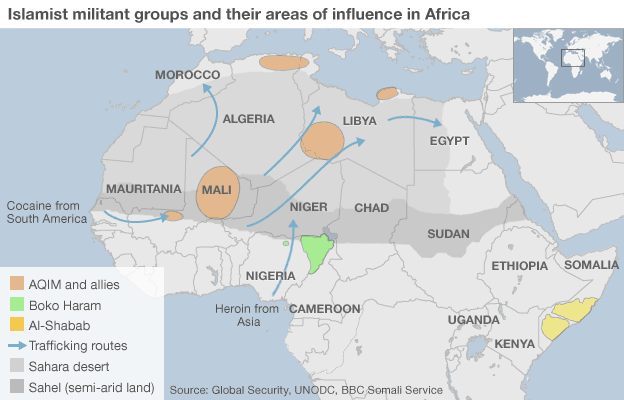
The recent Islamist militant threats in West Africa and Northern Africa aren’t going away any time soon, despite recent gains won by western militaries in the region.
Recent attacks in the region — including suicide bombings in Niger and an attack on an Algerian gas plant — have raised red flags about the stability of the region. Additionally, the withdrawal of French troops from Mali is being hailed by extremists as a victory. Although France did reclaim many northern cities from Islamist extremists, their short stint in the country — only 4 months — can easily be spun into an Islamist victory by the vehement extremist PR machines.
Africa has long been an ideal place for Jihadis, as many areas of many countries are largely ungoverned. The confusing terrain and lack of any sophisticated opponent forces allow these decentralized organizations filled with foreign fighters to thrive.
Al-Qaeda in the Islamic Maghreb covers parts of southern Libya, southern Algeria, northern Niger, Mauritania and northern Mali. While this al-Qaeda affiliate rightfully garners much attention, there are other threatening groups as well.
Boko Haram, one such group out of Nigeria, is possibly a link between al-Qaeda and piracy in Western Africa, but this theory has yet to be substantiated. It has been observed in Eastern Africa, where the Somali Islamist militant group al-Shabaab has very close ties with Somali pirates, and likely relies on their bounties for funding.
Many also believe the drug-trafficking is responsible for funding the operations of many of these groups.
The groups import drugs, particularly cocaine, from Latin America and turn them over for huge profits as they’re shipped to Europe. All it takes is a few men on the inside. Whether transit agents, dock workers or security supervisors, large amounts of money from the organizations moving the drugs can buy complete silence and discretion.
As the governing class of Africa continues to isolate itself from the everyday poor, many young men who are hurting for money are more than willing to pitch in for some extra compensation. Even more desperate members from unstable communities or backwater towns turn to religion, and eventually, Jihad.
These organizations use this kind of money for funding terrorist operations, but also for gaining new volunteers. Oftentimes, Islamist extremists will provide local Africans what their national governments won’t — food, water and security. In return, the extremists are given the opportunity to indoctrinate the desperate people, particularly the young men, with radical Islam and conscript them for service.
There are also many signs that the various disparate groups on the continent are beginning to connect and cooperate. Al-Shabaab agents have reportedly visited Mali to liaise with members from al-Qaeda in the Islamic Maghreb. Although right now, the groups are interacting in an informal manner, this would be a first step towards more coordinated official operations.
The need for France to militarily intervene in Mali is a striking statement of the severity of the problem. But fortunately, France was able to help the government of Mali make strides in ousting the Islamist uprising in the north, giving the continent some much needed momentum in the overall counter-terrorist battle.
The most important factor in nipping Islamist militancy in the bud is stabilizing economies and improving central governments of countries on the continent. Islamist extremists thrive on ungoverned territories, a desperate civilian population, and a lack of appropriate security apparatus to thwart their operations. Only once these things have been accomplished will Africa no longer be threatened by such instability that has plagued the Middle East for decades.